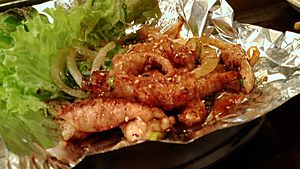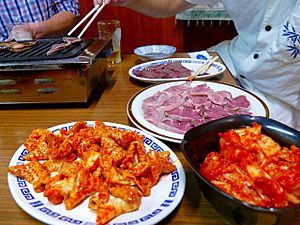Horumonyaki facts for kids
Horumonyaki (Japanese: ホルモン焼き) is a tasty kind of Japanese cuisine. It is made using parts of beef or pork that are not usually eaten, like the heart or intestines. These parts are called "offal."
A chef named Kitazato Shigeo created this dish. He worked at a restaurant in Osaka, Japan, that served Western-style food. He came up with Horumonyaki in 1940. It was inspired by another Japanese dish called Yakiniku, which is grilled meat.
The name horumon has an interesting history. It sounds like the word "hormone" and was meant to suggest "stimulation" or energy. It also sounds like a term in the Kansai dialect of Japanese, hōrumon (放る物). This term means "discarded goods," because these parts of the animal were often thrown away before. Horumonyaki is known for being a food that helps build "stamina" or energy.
What is Horumonyaki Made From?
Horumonyaki can be made from beef or pork. Pork is often used more than beef for this dish. The names for the different parts can change. This depends on the animal and also on where you are in Japan.
Common Horumonyaki Ingredients
Here are some of the common "horumon" items you might find:
- gari: This is the esophagus, which is the tube food goes down.
- hatsu: This means heart.
- hatsumoto: This is the "heart-base," which is the pulmonary artery.
- kobukuro: This is the uterus.
- oppai: This means "teat" and refers to the mammary gland.
- sagari: This is the diaphragm, a muscle near the lungs.
- shibire: This is the pancreas.
- shiro: This means "white" and refers to the intestine.
- teppō: This means "rifle" and refers to the rectum.
See Also
 In Spanish: Horumonyaki para niños
In Spanish: Horumonyaki para niños
 | Jessica Watkins |
 | Robert Henry Lawrence Jr. |
 | Mae Jemison |
 | Sian Proctor |
 | Guion Bluford |



